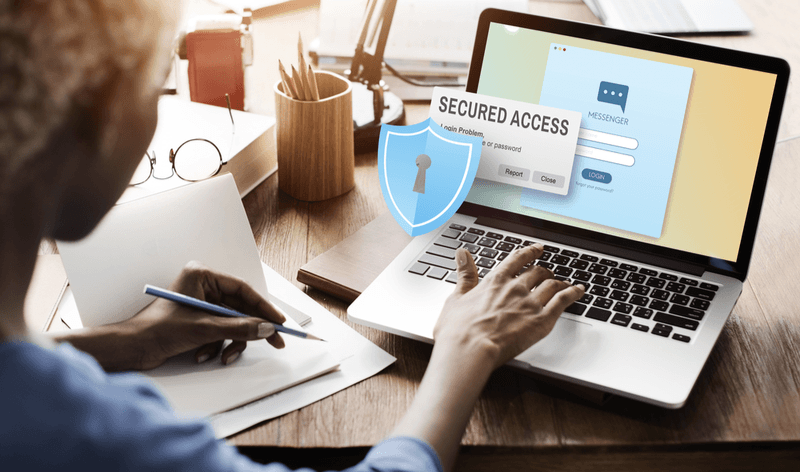
To celebrate the Safer Internet Day, we offer eight elementary tips for a secure digital everyday life on PCs, smartphones and more.
Safer Internet Day is an annual day (worldwide) of action to educate about the dangers on the internet and dealing with them. The day was initiated by the European Union and the institution INSAFE.
We give you eight simple but often neglected tips for using the Internet. As useful as the net is, so present and diverse are the dangers that threaten users – a classic are viruses and hackers, but also cyberbullying or extortion by means of ransomware or compromising imagery threatens the carefree use of the net.
1. Configure wireless networks securely
Internet security starts with your own infrastructure. Therefore, it is important that this is protected against third-party access. Today, wireless home surfing is an everyday thing. When you buy a router or receive one from your provider, passwords and other settings are standardized. That is detrimental to safety. So be sure to change the password for the wireless LAN, the password for router access, and the router name, the so-called SSID.
2. Use current software and operating system
Its own infrastructure also includes the operating system. This is often considered a self-catering. That’s only partially true: Regular updates ensure that hackers or malware do not exploit security vulnerabilities. If support for a system is lost, you should switch to a newer version. Old operating systems are often no longer supplied with security updates and therefore represent a real danger for data and users dar. The same is true for other software or the smartphone: keep it up to date. There is a widespread misconception that updates always bring problems first. This may happen, but is not nearly as common as many think. In addition, should it ever come to a faulty update, usually a patch replenished very quickly.
3. Use secure passwords
Email providers, social media, cloud accounts – on the Internet almost every user uses one or the other service, which requires a password. Unfortunately, passwords that are weak and easy to guess are still used – either for convenience or because it is assumed that “nobody cares about my data anyway.” That’s a fatal misconception. Therefore, use passwords that represent a certain hurdle, such as uppercase and lowercase letters, numbers, special characters, and a certain length. It is also recommended not to use the same password for each service!
4. Stay away from the admin account
Operating systems nowadays allow you to create different user accounts with different rights levels. Not infrequently, there is simply one user who is allowed to do everything. There has to be that, finally some things have to be fixed or installed now and then, but this account is not for everyday use. Log in for daily surfing and working as a normal user. The reason is obvious: There are many viruses, Trojans and other evildoers who have access to the core system of the computer in order to function. If the active user now captures a malware but does not have the required rights, it may not be able to take action.
5. Surf only on secure websites
Well-known sites like Facebook or Gmail support the encryption standard HTTPS. Especially in cases where a password is required or the handling of sensitive data is the order of the day, HTTPS is indispensable. Here we recommend the installation of the browser extension HTTPS Everywhere. This forces websites to transmit all data in encrypted form. The extension is free and available for Firefox, Chrome, and Opera.
6. Use two-factor authentication
Many Internet service providers or other web services already offer two-factor authentication, which secures the respective user account with an additional level of security. Banks usually use a small machine for their e-banking, which generates a random code. Every time you log in to your e-banking this code is different. So you are – with your PIN, which you must enter anyway, double protected. Other providers will do this with an additional number sent to you by text message or a previously defined question. Learn more about 2FA and how it is applied here.
7. Do not scatter data freely on the net
Make sure that an exchange of personal data such as address, e-mail, telephone numbers and alike takes place only in a secure environment (keyword: HTTPS). Old HTML / Java guestbooks on club websites are not a place to leave your email address or phone number. Leave your data only where it is unavoidable: eg: flight bookings or online shopping on reputable portals.
8. Beware of email attachments
Even experts have fallen for it: emails from seemingly legitimate senders, with serious concerns and contaminated attachments that may harm your network, delete or encrypt your data. For a long time, such emails are no longer permeated by bad grammar or even characters from other alphabets (often Cyrillic). It may also happen that your browsing habits are spied on and then write a customized phishing message (often Word files with alleged billing or the like). If you receive such an email, think carefully: Do I expect something like this? Is it plausible that I receive the expected by e-mail? If in doubt call the (alleged) sender by phone.
Contact Bleuwire™ today, we are at your disposal at any time and will gladly advise you on data security and other areas of the IT infrastructure.





